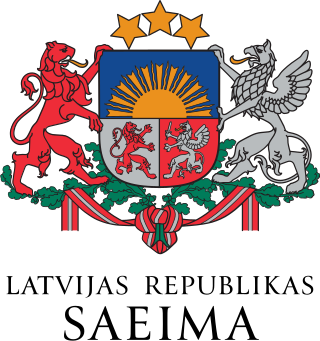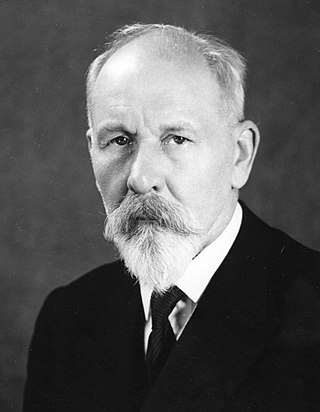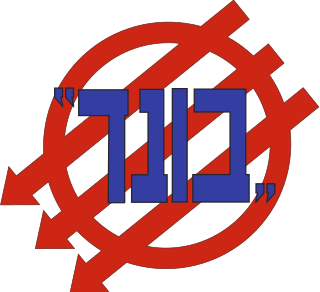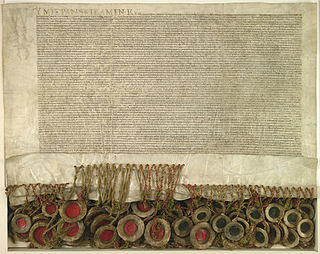Related Research Articles

The Republic of Central Lithuania, commonly known as the Central Lithuania, and the Middle Lithuania, was an unrecognized short-lived puppet state of Poland, that existed from 1920 to 1922. It was founded on 12 October 1920, after successful Żeligowski's Mutiny, during which the volunteer 1st Lithuanian–Belarusian Division under command of general Lucjan Żeligowski seized the Vilnius Region that Lithuania made claims to. It was incorporated into Poland on 18 April 1922.

The Saeima is the parliament of the Republic of Latvia. It is a unicameral parliament consisting of 100 members who are elected by proportional representation, with seats allocated to political parties which gain at least 5% of the popular vote. Elections are scheduled to be held once every four years, normally on the first Saturday of October. The most recent elections were held in October 2022.

The Wilno Voivodeship was one of 16 Voivodeships in the Second Polish Republic, with the capital in Wilno. The jurisdiction was created in 1926 and populated predominantly by Poles, with notable minorities of Belarusians, Jews and Lithuanians. Before 1926, the voivodeship's area was known as the Wilno Land; it had the same boundaries and was also within the contemporary borders of Poland at the time.
Poland has a multi-party political system. On the national level, Poland elects the head of state – the president – and a legislature. There are also various local elections, referendums and elections to the European Parliament.

Tomasz Stefan Arciszewski was a Polish socialist politician, a member of the Polish Socialist Party and the 31st Prime Minister of Poland, 3rd Prime Minister of the Polish government-in-exile in London from 1944 to 1947 during which the government lost the recognition of the Western powers.

Marian Zyndram-Kościałkowski was a Polish politician, freemason and military officer who served as voivode of Białystok Voivodeship in 1930-1934, Mayor of Warsaw in 1934 and 27th Prime Minister of Poland from 1935 to 1936.

The general election in the Republic of Central Lithuania was an election to the Vilnius Sejm (parliament) of the Polish-dominated Republic of Central Lithuania on 8 January 1922. The new parliament was intended to formally legalize incorporation of Central Lithuania into Poland. Such measure was fiercely opposed by Lithuania, which claimed the territory for itself. The election was boycotted by non-Polish population and its results were unrecognized by either the Lithuanian government in Kaunas or the League of Nations. The elected parliament convened in February and, as expected, voted on 20 February 1922 to have the Republic incorporated into Poland. At the end of March 1922, Central Lithuania became Wilno Land of the Second Polish Republic.

Jakub Wygodzki was a Polish–Lithuanian Jewish politician, Zionist activist and a medical doctor. He was one of the most prominent Jewish activists in Vilnius. Educated as a doctor in Russia and Western Europe, he established his gynecology and pediatric practice in 1884. In 1905, he was one of the founding members of the Constitutional Democratic Party (Kadets) in Vilnius Region. In 1918, he was co-opted to the Council of Lithuania and briefly served as the first Lithuanian Minister for Jewish Affairs. After Vilnius was captured by Poland, Wygodzki was elected to the Polish parliament (Sejm) in 1922 and 1928. He died in the Lukiškės Prison during the first months of the German occupation of Lithuania during World War II.

The General Jewish Labour Bund in Poland was a Jewish socialist party in Poland which promoted the political, cultural and social autonomy of Jewish workers, sought to combat antisemitism and was generally opposed to Zionism.

The Union of Lublin was signed on 1 July 1569 in Lublin, Poland, and created a single state, the Polish–Lithuanian Commonwealth, one of the largest countries in Europe at the time. It replaced the personal union of the Crown of the Kingdom of Poland and the Grand Duchy of Lithuania with a real union and an elective monarchy, as Sigismund II Augustus, the last of the Jagiellons, remained childless after three marriages. In addition, the autonomy of Royal Prussia was largely abandoned. The Duchy of Livonia, tied to Lithuania in real union since the Union of Grodno (1566), became a Polish–Lithuanian condominium.
The Legislative Sejm or Constituent Sejm was the first national parliament (Sejm), and simultaneously Constituent Assembly of the newly independent Poland, sitting from 1919 to 1922. It was elected in the 1919 Polish legislative election.
Polish Nonpartisan Organization was a political movement of nonpartisan politicians, that operated in the Republic of Central Lithuania. It was part of the Association of National Parties and Organizations, which, following the 1922 general elections, holt 43 seats in the Sejm of Central Lithuania. It was represented by Wiktor Czarnowski.
The Popular Councils was a centre-left political party in the Republic of Central Lithuania. Following the 1922 general elections, it held 34 seats in the Sejm of Central Lithuania, being the second most popular party. After the Peasant Group of Popular Councils broke away from the party, its number of seats dropped to 27. Its ideology was moderate radicalism, and it supported the incorporation of Central Lithuania into Poland. Its leader was Józef Małowieski.
The Polish People's Party of Wilno Land was a left-wing political party in the Republic of Central Lithuania. Following the 1922 general elections, it held 13 seats in the Sejm of Central Lithuania. Its ideology consisted of the agrarianism and agrarian socialism, and it supported the authonomy of Central Lithuania from Poland. Its leader was Bronisław Krzyżanowski.
The Democratic Party was a left-wing political party in the Republic of Central Lithuania. Following the 1922 general elections, it held 4 seats in the Sejm of Central Lithuania. It supported independence of the Sejm from outside influence, and demanded that it should held control over the state administration until the possible future unification with Poland. It believed that the idea of the federation with Poland, proposed by Józef Piłsudski, was impossible to organize at that time, and would have to be postponed for the future. Its leader was Witold Abramowicz.
The Popular Association "Odrodzenie-Wyzwolenie" was a centre-left political party in the Republic of Central Lithuania. Following the 1922 general elections, it held 5 seats in the Sejm of Central Lithuania. Its political programme was identical to the one of Polish People's Party "Wyzwolenie" that operated in Poland, and was based on agrarianism and agrarian socialism. It supported the authonomy of Central Lithuania from Poland, however it did not oppose the possible future federation with it, as proposed by Józef Piłsudski. Its leader was Ludwik Chomiński.
The Popular Association "Odrodzenie" was a centre-left political party in the Republic of Central Lithuania. Following the 1922 general elections, it held 3 seats in the Sejm of Central Lithuania. Its political programme was based on agrarianism and agrarian socialism, and was similar to the one of Polish People's Party "Wyzwolenie" that operated in Poland. It supported the federation of Central Lithuania with Lithuania. Its leader was Stefan Mickiewicz.
Polish Socialist Party of Lithuania and Belarus was a left-wing political party, that was an autonomous branch of Polish Socialist Party, and which operated in Lithuania and Belarus in the late 1910s and early 1920s. Its political programme was identical with the one of Polish Socialist Party, and was based around left-wing nationalism and revolutionary socialism.

Sejm of Central Lithuania, also known as the Vilnius Sejm, or Wilno Sejm or the Adjudicating Sejm, was the parliament of the short-lived state of Central Lithuania. Formed after the elections of 8 January 1922, it held its proceedings from 1 February to 1 March of that year. It had 106 deputies. Dominated by Polish representatives, it requested Central Lithuania's annexation by Poland and dissolved shortly afterward.

Witold Abramowicz was a politician and jurist. In 1919, he served as the mayor of Vilnius, Lithuania, and from 12 October 1920 to 16 January 1921, he was the chairperson of the Provisional Governing Commission, an executive government of the Republic of Central Lithuania. In 1922, he was the leader of the Democratic Party, which he represented in the Sejm of Central Lithuania from 1 February to 1 March 1922. From 11 March 1928 to 10 July 1935, he represented the Nonpartisan Bloc for Cooperation with the Government for Vilnius electoral district, in the Senate of Poland.
References
- 1 2 Sejm Wileński 1922 : przebieg posiedzeń według sprawozdań stenograficznych w opracowaniu kancelarji sejmowej , Vilanous, 1922.
- ↑ Wincenty Witos; Eugeniusz Karczewski: Dzieła wybrane: Moja tułaczka w Czechosłowacji / do druku ... (1995). (in Polish). 3. Warsaw: Ludowa Spółdzielnia Wyd. p. 542. ISBN 83-205-3497-6.